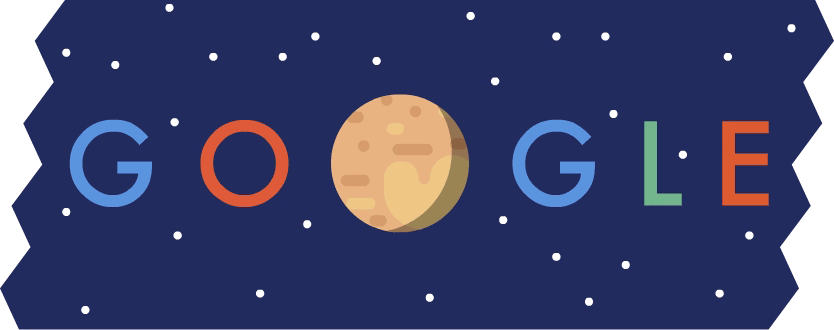Google Doodle celebrates historic New Horizons flyby of Pluto

Google Doodle has celebrated the New Horizons historic flyby of Pluto – the culmination of a nine year journey across the solar system covering 3 billion miles (4.8 billion kilometres).
The spacecraft will come within 7,800 miles (12,500 kilometres) of the dwarf planet at around 12.49pm GMT and is expected to make contact with Nasa at around 2am GMT.
The first images of Pluto in high definition will be returned in the early hours of the morning.
During the flyby – which will last around two hours – New Horizons will be busy collecting data. After this it will start sending back pictures and data, with a time delay of around four hours.
Speaking about the quality of images due to be returned, New Horizons principal investigator Alan Stern said if we were looking at Earth, we would be able to see stadiums. He told IBTimes UK earlier this year: "If we flew over London we'd be able to spot individual buildings. To be specific, the best resolution will be about 70m per pixel, so when I say buildings I mean things like stadiums or large buildings in the down town – not individual houses."
Google said: "Earth is getting its first chance for an up close and personal peek at Pluto, the ball of rock and ice orbiting at the furthest edge of our solar system.

"It's all thanks to New Horizons, a thousand-pound space probe NASA sent spinning through space at 31,000 miles per hour. The probe's interstellar jaunt spanned more than 9 years and 3 billion miles. That's one heck of a commute!
"The pictures New Horizons will send back to Earth are the first of their kind, painting scientists a more vivid picture of the far-off dwarf planet. Armed with these new insights, we'll be able to pave a path for the next milestone in mankind's journey of cosmic discovery.
"Today's Doodle was created by Kevin Laughlin in honor of New Horizons' intrepid voyage to Pluto's distant corner of the solar system. Celebrate this scientific breakthrough on Nasa's New Horizons YouTube page, where you'll find videos detailing the extraordinary discoveries the space probe uncovers.
In terms of what they expect to find, Stern added: "We really are going exploring, so we're very much looking forward to that but it's hard to predict. Exploring is a wonderful thing that humans do and I think New Horizons' flyby of Pluto will be one of those historic events of the 21st century."
© Copyright IBTimes 2024. All rights reserved.






